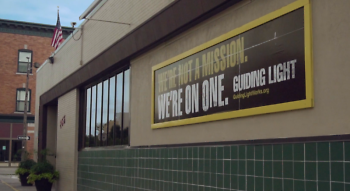While some organizations halted operations during the onset of COVID-19 in West Michigan, Guiding Light has adapted in order to continue its rescue, recovery and re-engagement programming in light of rising needs.
The Grand Rapids-based nonprofit initially took programming off-site, adopted video conferencing tools and paused the intake process. Now, men in the Recovery program have returned to Guiding Light’s downtown headquarters and the organization has restarted intake with several new safety precautions in place.
Protocols include regular hand-washing, wearing masks, physical distancing, daily health screening and temperature checks. For new clients, the organization added a strict 14-day quarantine requirement but has since adjusted certain restrictions to meet changing needs and improve retention.
Recovery Director Brian Elve explained it became apparent early on that such isolation was not well-suited to support someone just entering recovery. He said one of the main challenges COVID-19 has presented is the need for physical distance and separation from others.
“The men served at Guiding Light know the pain of isolation all too well. That level of separation causes them to want to withdraw even more,” Elve said. “Their first reaction is to run when they feel uncomfortable, so we knew we needed a gentler approach. Figuring out a good procedure has meant finding ways to keep everyone both safe and connected.”
In recognizing the need for new clients to feel a strong sense of community as they start on the path to lifelong abstinence, leadership adjusted the intake process to still mitigate any spread of COVID-19 but also make sure those men feel included and supported.
“The first thing we shifted was putting quarantine rooms in the same hallway as the others rather than in a separate area,” Elve said. “While they still have their own room and have food delivered to them, this change allows men new to the recovery journey to be able to hear and talk with the other men.
“We also increased their ability to participate in some activities, such as joining support groups over video and sitting at a distance to watch the classes we offer.”
Men in the program also started to come up with ideas of their own in order to stay connected with one another. In addition to utilizing video conferencing, they identified types of no-contact exercise and other outdoor activities that fit within Guiding Light’s holistic approach to health and wellness as part of recovery.
Although intake remains steady for now, Elve shared the organization is seeing an increase in inquiries about whether the organization is open. Recent stats show an increase in people turning to alcohol consumption and other substances to cope with fear and grief during this time of isolation.
According to Nielsen data, off-premise sales of spirits during March through the beginning of May rose 34% compared to the same period last year. An Express Script study found anti-anxiety prescriptions also jumped 34% since stay-at-home orders began. In addition, overdose deaths are now rising.
“I think as a society with all the distractions of life we normally have, it’s hard to slow down without being uncomfortable and seeking ways to cope with those feelings,” Elve noted. “The shelter-at-home aspect of the pandemic can mean a lot of time alone to really see yourself and ask, ‘who am I?’
“That question mirrors one of the first things we talk about with the guys who join our program. ‘Who are you?’ can be a really difficult question to answer, but it’s important for us to be able to meet the men where they are at in order to equip them with the resources they need to stay sober and live life in a new way.
“We anticipate the need for our intensive drug and alcohol treatment program will be greater than ever as we continue to emerge from quarantine. We are preparing to meet increased demand with the enhanced safety protocols we’ve implemented. Guiding Light will continue to adapt, much as we have done throughout our more than 90-year history.”
The Rapidian, a program of the 501(c)3 nonprofit Community Media Center, relies on the community’s support to help cover the cost of training reporters and publishing content.
We need your help.
If each of our readers and content creators who values this community platform help support its creation and maintenance, The Rapidian can continue to educate and facilitate a conversation around issues for years to come.
Please support The Rapidian and make a contribution today.
